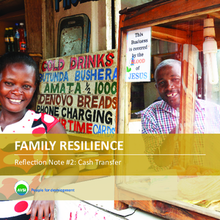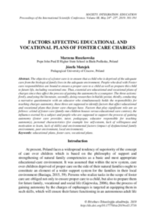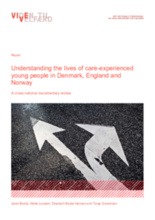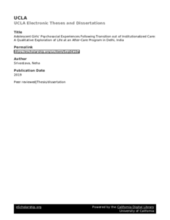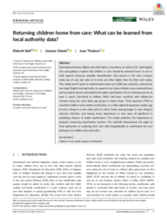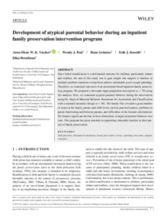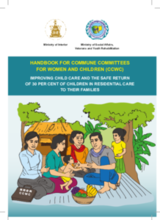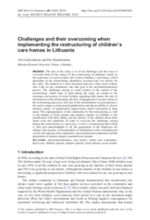Displaying 521 - 530 of 991
This Reflection Note is intended as a means for AVSI staff and implementing partners on the FARE project to capture emerging learning as relates to the theory of change elaborated during project design. Particularly, the Reflection Note seeks to answer how necessary and effective cash transfers are as a component of the economic strengthening pathway, hypothesized as crucial for the project goals of building family resilience as a means of preventing child-family separation or ensuring successful reintegration of children into family care.
The purpose of the Home Thrive Scale™ is to assess the possibility of a child staying with or returning to their family and to identify services needed to make reintegration possible.
In this study, the authors analyzed the literature on foster care in Poland and conducted a narrative questionnaire with an educator who simultaneously holds the responsibility for teaching youth in foster care autonomy in order to identify factors that affect educational and vocational plans that foster care charges have.
This working paper has reviewed cross-national datasets for the general population and available national data and other relevant (grey and academic) literature concerned with young people in care and care leavers in the three study countries.
This paper explores the leaving care policies of the Australian state of Victoria, and the reasons for policy "inaction" on providing post-care support to youth leaving care until the age of at least 21 years old.
This dissertation study aimed to describe and understand adolescent girls’ subjective experiences of life in an after-care facility after transitioning out of institutionalized care in Delhi, India.
This study used 8 years of administrative data (on 2,208 care entrants), collected by one large English local authority, to examine how many children were returned home and to explore factors associated with stable reunification (not re-entering care for at least 2 years).
Since failed reunification is a detrimental outcome for children, particularly infants and toddlers, the aim of this study was to gain insight into support to families in multiple-problem situations in the Netherlands to help them achieve sustainable good-enough parenting.
This handbook highlights the role commune committees for women and children (CCWCs) can play in support of implementing the Action Plan for improving child care, which is being carried out in five priority provinces in Cambodia. The Action Plan intends to safely return 30 per cent of children in residential care to their families by the end of 2018, as well as establish effective preventive and gatekeeping mechanisms to prevent unnecessary family separation. This handbook is useful in strengthening CCWCs’ roles and enhancing their knowledge and capacity to protect children in their communes.
The aim of the study is to reveal challenges and the ways to overcome them in the context of the restructuring of childcare, based on the experience of social workers who work in children’s care homes in Lithuania, which participate in the restructuring.

